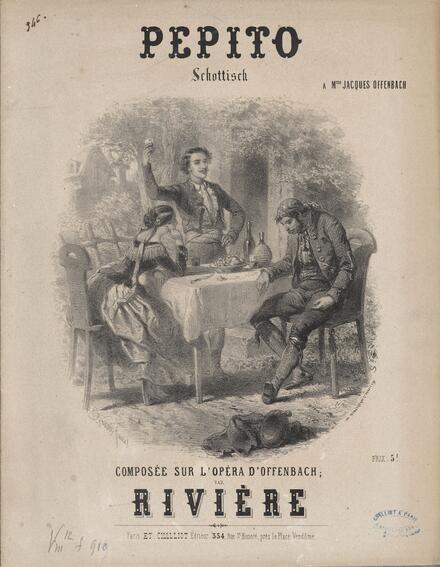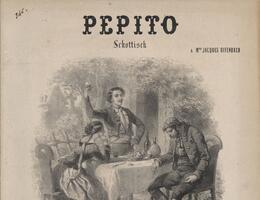Pépito

Operetta in one act premiered at the Théâtre des Variétés on 28 October 1853.
In 1853, while he was musical director of the Comédie-Française, Offenbach teamed up with librettists Léon Battu and Jules Moinaux for this one-act, eight-number operetta inspired by a vaudeville by Scribe. Initially entitled Vertigo, after the hotelier who is courting Manuelita, the young orphan girl who runs the neighbouring inn, the score owes its final title to a character that will never be seen: Pépito, the heroine’s fiancé, who has left for war. Faithful to her beloved, Manuelita rejects Miguel, a childhood friend who has returned to the village after finishing his studies. But she will finally respond to his love after learning of Pépito’s recent marriage. If Offenbach indulges in the Spaniolizing fashion with this plot set in the Basque country, he takes his inspiration from Rossini more than from real Iberian music: Vertigo’s aria “À tous les métiers, moi j’excelle” parodies Figaro’s entrance cavatina in The Barber of Seville. With its frank cheerfulness, tinged with a few touches of melancholy, Pépito was favourably received at its premiere on 28 October 1853 at the Théâtre des Variétés, under the baton of Aimé Carpier. In Le Ménestrel, Jules Lovy reported that the drinking song “Bruit charmant à mon oreille”, “whose bright colours and lively rhythms captivated the entire audience”, was encored twice. Adapted in German under the title Das Mädchen von Elizondo, the operetta was performed at Vienna’s Carltheater on 18 December 1858. As Offenbach’s first published operatic score, it gained him admission to the French Society of Dramatic Authors and Composers.
Documents and archives
Voir le document répertoriéScientific publications
Articles
Offenbach and Spain
Publication

